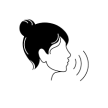
We spend between one-third and one-half of our waking hours not living in the present. During that time, we engage in self-talk. Our inner voice allows us to use language internally to reflect on our lives. However, this inner voice can also lead to negative self-talk, known as "chatter." When we turn inward to solve problems, we often ruminate, worry, and catastrophize, creating a negative cycle. This inner voice is a powerful tool, but it can become a curse rather than a blessing. Ethan Kross, a professor of psychology and management and author of "Chatter: The Voice in Our Head, Why It Matters, and How to Harness It," explores this phenomenon.
I will listen to the questions asked by the audience and respond accordingly. I am simulating this exchange by using my inner voice. Our inner voice helps us control ourselves. Think about the last time you wanted to have a treat late at night, but then you told yourself, "Don't do it, you'll regret it in the morning." That's your inner voice. Additionally, our inner voice helps us create a narrative that explains our experiences and shapes our understanding of our identity.
While our inner voice can be helpful, it can also be detrimental. Firstly, it makes it difficult for us to concentrate as it consumes our attention. It can also create friction in our relationships because we focus on our problems and fail to listen to others. Furthermore, it can make us more irritable and lead to displaced aggression. Lastly, chatter can have negative physical health effects. Although stress is an adaptive response, it becomes toxic when it remains chronically elevated over time. This is exactly what chatter does. We experience a stressor in our life, it ends, but our inner chatter perpetuates it.
We constantly dwell on that event repeatedly. This continuous repetition keeps the stress response active, which can lead to conditions such as cardiovascular disease, chronic inflammation, and even cancer. The implications of this incessant mental chatter cannot be overstated. However, there is good news: there is a science-based toolkit available that can help you regain control of your inner voice.
There are various things we can do on our own, as well as ways to utilize our relationships with others and interact with our physical surroundings. Rituals are a prime example of these tools.
We have a strong desire for control.
When experiencing mental chatter, it often feels like our thoughts are controlling us. However, science has taught us that we can counteract this feeling of being out of control by creating order in our surroundings. Rituals provide a way to achieve this.
A ritual is a structured series of actions that are consistently performed in the same manner each time. By engaging in these repetitive behaviors, we establish a sense of order and control. This can be particularly beneficial when we find ourselves overwhelmed by mental chatter. Rafael Nadal, the renowned tennis player, faces a similar challenge on the court. He manages the voices inside his head by engaging in rituals. During breaks between play, he goes to his bench, takes a sip from one water bottle, then another, and finally places each bottle back in its original position on a diagonal to the court. This ritual helps him manage his mental chatter.
There is no one-size-fits-all solution for managing mental chatter. Instead, the real challenge lies in discovering the unique combination of tools that work best for each individual. Experiencing mental chatter does not make you weak; it simply makes you human. Welcome to the human condition.






Comments
There are no comments for this story
Be the first to respond and start the conversation.